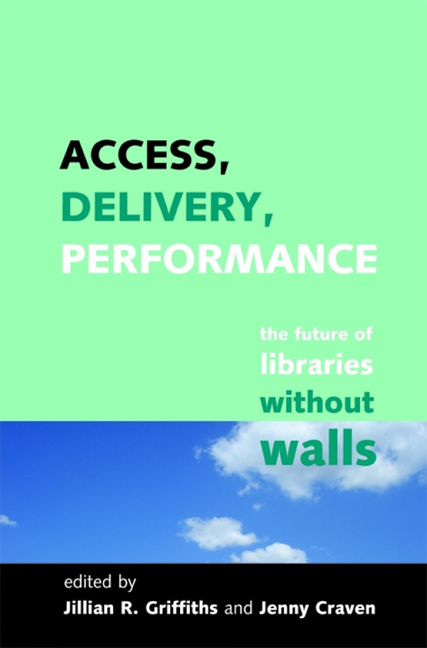Book contents
- Frontmatter
- Contents
- Contributors
- 1 Introduction
- 2 The Library Research Unit at the University of Lancaster, 1967–1972: a memoir
- Theme 1 Libraries, learning and distance learning
- Theme 2 Widening access to information
- 5 Library services for visually impaired people: a UK perspective
- 6 Public libraries, an enduring freedom: widening access to learning, information and culture
- 7 Sceptic 2.0? Social networking technologies in public libraries
- Theme 3 Changing directions of information delivery
- Theme 4 Performance, quality and leadership
- Peter Brophy: a selected bibliography
- Index
6 - Public libraries, an enduring freedom: widening access to learning, information and culture
from Theme 2 - Widening access to information
Published online by Cambridge University Press: 08 June 2018
- Frontmatter
- Contents
- Contributors
- 1 Introduction
- 2 The Library Research Unit at the University of Lancaster, 1967–1972: a memoir
- Theme 1 Libraries, learning and distance learning
- Theme 2 Widening access to information
- 5 Library services for visually impaired people: a UK perspective
- 6 Public libraries, an enduring freedom: widening access to learning, information and culture
- 7 Sceptic 2.0? Social networking technologies in public libraries
- Theme 3 Changing directions of information delivery
- Theme 4 Performance, quality and leadership
- Peter Brophy: a selected bibliography
- Index
Summary
Introduction
The career of Peter Brophy spans some of the most interesting decades in the history of public libraries. Peter himself has been an advocate of change and innovation and a keen observer of what is and is not working. In his early career the emergence of new librarians wanting a library to be an active participant in community life met with a mixture of enthusiasm and apprehension. The spirit of community librarianship emerges in the first decade of the 21st century as a mix of user-oriented provision, partnership working, devolution and community engagement with a performance focus on impact beyond outputs.
The library evolves to meet a challenge
Under sometimes negative pressure the library changes slowly to meet new needs. The negative pressure is the easily voiced fear that the library has become outdated by social change, rendered redundant by new communications technologies; or it is the financial pressure of the parent institution: school, college, university or local authority. With the best motivation the library changes also in response to a community expectation, perceived or stated, or to an anticipated need or aspiration.
Increasingly it is not passive but proactive but this is a requirement of a service that is interventionist not reactive, that originates rather than supports initiative, and that leads rather than waits.
Conventionally, the library is a resource that underpins initiative. Collections, information, space to read and study, staff assistance form the main elements of library provision. Ranganathan's five laws of library science (Ranganathan, 1931) are about the collection, organization and delivery of resources to inform and support an initiative, a learning venture or research:
Books are for use.
Every reader his or her book.
Every book its reader.
Save the time of the reader.
The library is a growing organism.
Underpinning the five laws is a sense of philanthropy, an espousal of liberty and freedom of thought and an inherent desire to support the learner that is not immediately evident. Essentially the five laws determine the critical criteria that make an efficient and effective library. Ranganathan's five laws have proved to be so powerful that they have spawned generations of variations and extrapolations translating them into new sets of principles to meet different settings and periods. For example see Application of Ranganathan's Law to the Web Webology (www.webology.ir/2004/v1n2/a8.html#18).
- Type
- Chapter
- Information
- Access, Delivery, PerformanceThe Future of Libraries Without Walls, pp. 75 - 94Publisher: FacetPrint publication year: 2008



